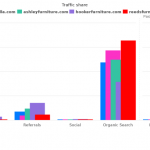Why major American corporations have struggled in China: eBay
Why major American corporations have struggled in China: eBay

This article is part of a series about the importance of cross-cultural design, the first two installments of which were published on February 16-17, 2017.
eBay has been involved with China for a while, starting in 2004, so one can see an example of what the longer-term timeline looks like for a very successful American company trying to gain a foothold into China without guanxi. eBay absolutely lost its battle against the most similar Chinese company, Alibaba. In an immediate response to eBay entering China, Alibaba created Taobao to be a direct competitor. As of January 5th 2017, Alibaba (NYSE: BABA) had a market cap of $ 235.93 billion US dollars whereas eBay (NASDAQ: EBAY) had a market cap of $ 33.55 billion US dollars.
There has been a consensus that lack of guanxi was eBay’s fundamental problem in China. In this kind of direct consumer-to-consumer business, guanxi refers to the relationship which forms between a buyer and a seller that goes beyond a mere transactional relationship. Guanxi then translates into a trust which facilitates the transaction and is considered necessary by the average Chinese consumer. But eBay’s site did not allow for direct communication between buyer and seller, meaning that Chinese consumers often do not feel good about using eBay to engage in transactions.
See Also: Alibaba joins the connected car frenzy along with SAIC
Another issue for eBay was that the primary form of payment was the online use of credit cards. Compared with Americans, the Chinese are much more averse to using their credit card online due to security concerns. So, Chinese consumers are more comfortable having online wallets. In addition, there is a much larger percentage of the Chinese population that simply does not have a credit card.
A mistake that is often overlooked in other analyses of eBay’s entry into China is its marketing strategy. In an aggressive attempt to gain public exposure, eBay purchased exclusive marketing rights from Sina, Soho, and Netease, all of which are major advertising portals in China. To an objective outsider, this may seem like an expensive yet effective marketing strategy, but Alibaba CEO Jack Ma knew better. Ma spent millions on television ads as he knew that his and eBay’s target audience was much more likely to be watching TV than browsing the Internet. As said by Forbes contributor Helen H. Wang, “I heard the ads for Taobao popping up on TV almost every half hour.” Now taobao.com is the 3rd most visited website in all of China while eBay is 36th according to Alexa website popularity rankings.
See Also: Self-Proclaimed eBay Hackers Put Alleged Personal Data Up For Sale
The obvious mistake made by eBay here was a critical lack of understanding of the habits of its target audience in addition to ignoring the importance of guanxi. This lesson is not necessarily unique to attempts by American companies to market in China, but it seems to occur frequently there as American businesses see China more than most other nations as a “black box” in regard to the population’s habits and everyday life.
In terms of what could have been done, obviously eBay could have better understood its target customers’ habits, created more effective advertising, and accommodated their preferred means of payment. However, doing all of these things likely would not have been enough. It could and should have allowed for person-to-person guanxi by adding direct communication between purchaser and seller. Finally, eBay should have tried to develop corporate guanxi and strike deals with well-known retailers in China to allow eBay to have free postings and sales on its site as a means to naturally increase viewership, usefulness, and brand recognition in China.
The author is Clayton “CJ” Jacobs, who is currently an Entrepreneur-in-Residence with, and the Head of Cross-Cultural Design at, ReadWrite. An area of focus for him is helping American companies understand and enter the Chinese market through taking a modern user-centric product design approach. You can contact him directly at clayton.michael.jacobs(at)gmail.com or find him on Twitter & LinkedIn.
The post Why major American corporations have struggled in China: eBay appeared first on ReadWrite.
(43)









